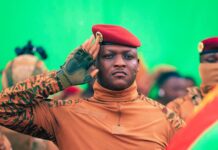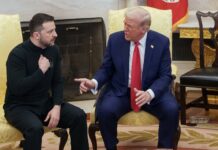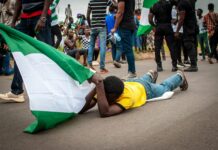Captain Ibrahim Traoré has been president of Burkina Faso for around one year at this point after taking over in a coup. During his time in power, he has managed to gain popularity online around the African continent, in his speeches where he speaks against what he calls French and Western Imperialism and exploitation of Africa.
There are many online who see Traoré as a strong young African leader, standing up to French and Western imperialism in Burkina Faso. His supporters see in him what they hope for the future of African leaders.
While on the other hand, there are those who view him as an Authoritarian leader, cosying up to the Russian government, in order for him to hold onto power for as long as possible. His detractors perceive him as being emblematic of the consequences of insecurity and inadequate governance prevalent in West and Central Africa.
Which, as a result, has witnessed a surge in coups, reflecting a broader pattern of political instability across the Sahel, paving the way for greater Russian influence in the region.
President Kaboré Deposed
Burkina Faso, prior to the overthrow of the government, had a democratically elected president, named Roch Kaboré. President Kaboré had been Burkina Faso’s third president. He had been first elected in 2015.

Kaboré’s presidency, however, had been complicated by the increasing instability in Burkina Faso as a result of terrorist groups operating within Burkina Faso. Kaboré’s government had been unable to effectively deal with the security crisis befalling Burkina Faso.
In January 2020, he had been re-elected president, however he would not complete his second term in office as he would be overthrown in a coup by the army in Burkina Faso. On 24 January 2022, Kaboré was deposed by the military. The military declared that the parliament, government, and constitution had been dissolved. They cited the growing insecurity in the country for their reasoning for the government overthrow.
Kaboré would then resign as president and had been placed on house arrest by the military at the time.
Following the successful military coup Burkina Faso had been suspended from various international organisations, such as: the African Union, La Francophonie, and the Economic Community of West Africa States.
The coup leaders had appointed Paul-Henri Sandaogo Damiba to lead as interim president on the 31st of January 2022. Damiba had been a lieutenant colonel and commander of Burkina Faso’s third military region.

The military junta, led by Damiba, pledged to the people of Burkina Faso that they would improve security and that they would eventually restore civilian rule in the country. However, that had not happened. Rather than improving the security situation in Burkina Faso, it got considerably worse.
The military was now operating under sanctions from its West African neighbours in the Economic Community of West African States. By September 2022, around 40% of Burkina Faso’s territory, had been under the control of non-state armed groups.
Ibrahim Traoré Takeover
Due to the worsening security conditions in Burkina Faso, many within the country became discontented with the military junta. This was a sentiment felt by both civilians and members of the military. As a result, another coup had taken place on the 30th of September 2022. Damiba would only serve as interim president for 8 months after overthrowing Burkina Faso’s civilian government.
His replacement was the 34-year-old military captain Ibrahim Traoré. Traoré is seen as a person motivated by Marxist ideology and Pan-Africanism. He has often been compared to Burkina Faso’s former revolutionary leader Thomas Sankara. Due to the fact that they both managed to take power around the same age and the fact that Traoré is often seen wearing a red beret, which was often worn by Sankara.
He had so far, throughout his rule, shown a strong rebuke of France and other Western nations and sought closer ties to Russia. In February 2023, Traoré’s government expelled French forces stationed in Burkina Faso who were assisting the military in fighting the local insurgency. In place of the expelled French troops, Traoré sough to forge closer security ties to Turkey and Russia.
The Ghanaian government has accused Ibrahim Traoré of enlisting Wagner mercenaries to fight within Burkina Faso, however it’s not clear whether Wagner troops had been deployed in Burkina Faso, at this point.
Exit from ECOWAS
Not long after Ibrahim Traore’s rise to power, another coup would take place in neighbouring Niger. West African nations in the Economic Community of West Africa States decided that they could not stand back as more and more governments fell to coups. As a result led by Nigeria, they had begun to threaten Niger with possible military intervention to restore the country’s civilian government.
In response to the threats made by ECOWAS, Ibrahim Traoré and the military junta in power neighbouring Mali and Niger, formed a military alliance, declaring that they would defend each other in face of any foreign intervention aimed at toppling their military regimes.
The threats of military intervention ended up not amounting to anything from West African leaders. However, the coup leaders in the three nations’ relationship with West Africa wouldn’t get any better as time passed.
This bad blood between the two sides eventually culminated in the three countries Niger, Burkina Faso and Mali, announcing that they would fully withdraw from ECOWAS. They accused ECOWAS of failing to provide them with adequate support in their fight against terrorism.
Traoré’s rule
Traoré’s rule has so far faced many of the same challenges as Damiba and the former civilian president. Fighting between the army and armed groups has continued.
His regime has similarly struggled to take back control over the parts of the country that have been occupied by armed forces. This lack of progress similarly has led to dissatisfaction among members of the military and as a result, Traoré himself (who took power in a coup), has faced multiple coup attempts by members of the military. However, he has at least so far, managed to maintain his grip on power.
Human Rights Watch
The fighting between the army and terrorist groups operating in Burkina Faso has been intense. The at times heavy handed approach taken by members of the military has been criticised by human rights advocates. The biggest report so far has come courtesy of Human Rights Watch. They released a report of a massacre that had taken place in a village by Burkina Faso’s military.
In their report Human Rights Watch reported that the members of the village had been accused by the army of aiding some of the terrorist groups and in retaliation the massacre had occurred by members of the military. The accused the Burkina Faso military of executing at least 223 civilians, including at least 56 children, in two villages on February 25, 2024.
Ibrahim Traoré’s government denied the reports and claimed that they were investigating the incident.
This narrative sheds light on the profound ramifications of decades-long corruption and conflict in West Africa. Beyond the realm of political turbulence and clashes with terrorist entities lies the harsh reality endured by millions of West African citizens, whose lives have been profoundly disrupted as a consequence. Unless the region can undertake substantial reforms, the prospect of a brighter future remains elusive for many within West Africa.











